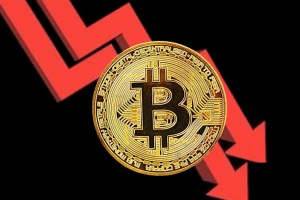Due to concerns about impending selloffs by the German government and creditors of the defunct cryptocurrency exchange Mt. Gox, bitcoin prices hit a four-month low on Monday, 8 July, and values of other significant tokens dropped significantly as well.
Mt. Gox was a cryptocurrency exchange based in Tokyo. It operated between 2010 and 2014. At its height, it handled almost 70% of all Bitcoin transactions.
The exchange is also referred to as MtGox or Mt Gox, even though it is most frequently known as Mt. Gox.
The exchange filed for bankruptcy in 2014, but for years afterward, it was the focus of legal disputes and rumors.
Very recently, the defunct crypto exchange began making repayments in bitcoin and bitcoin cash to some of its creditors through a number of designated crypto exchanges.
Bitcoin’s price dropped more than 6% early on Monday morning. As of 3:15 a.m. EST, it was trading at about $55,500, down 4% from about the same time the previous day.
The price of the most valuable digital asset in the world is at its lowest point in months, having dropped by about $18,000 from its peak of little under $74,000 in March—a loss of around 25%.
Similar events occurred with Ether, the second-largest cryptocurrency in the world by market capitalization behind Bitcoin. It fell by almost 7% before rising to trade at about $2,900 at 3:15 a.m., down 4% for the day.
With drops of between 9% and 11% paring to losses of between 2.5% and 7% by 3:15 a.m., the course was also replicated by Binance’s BNB, Solana, XRP Ripple, Dogecoin, and Cardano’s Ada — the next major cryptocurrencies, excluding stablecoins tied to established currencies like Tether and USDC.
By 3 a.m. EST, the value of the whole cryptocurrency market had decreased by over $20 billion in only one day, or about 2%, compared to the previous day.
The widespread cryptocurrency’s selloff on Monday raises the possibility that it may continue its gloomy, weeks-long downward trend as it descends from all-time highs in March.
The decline coincides with waning interest in bitcoin exchange-traded funds (ETFs), monetary policy uncertainty, and concerns that the insolvent Tokyo cryptocurrency exchange, Mt. Gox, may cause a crash when it pays its debt to creditors.
The exchange, which was previously among the largest cryptocurrency platforms globally, filed for bankruptcy ten years ago as a result of hackers stealing the majority of its cryptocurrency holdings between 2011 and 2014.
Compared to the time the exchange filed for bankruptcy, the price of bitcoin has increased by about ten times. According to CNBC, the bitcoin haul would be valued more than $58 billion today.
After filing for bankruptcy, the exchange was able to recover some money, with tokens currently valued at about $9 billion.
Markets have reacted to this anticipated large selloff of Bitcoin, as creditors are expected to sell off their digital assets at a far higher price than when they lost them in a bid to make huge gains from the wide price difference.
More than half of the cryptocurrency market’s value is derived from Bitcoin, and smaller crypto tokens and the market as a whole often follow its trends.
The decline in the cryptocurrency market, however, is not just due to Mt. Gox; the German government is also causing a stir by hurriedly exchanging hundreds of millions of dollars’ worth of Bitcoin for fiat money.
Since June, Berlin has been moving its bitcoin holdings to Bitstamp, Coinbase, and Kraken exchanges as part of the European government’s efforts to sell off and liquidate assets that it had confiscated from different criminal organizations.
Concerns over large market selloffs have increased as a result of the transfers, and Germany is said to still possess roughly $2.2 billion worth of Bitcoin, according to Arkham Intelligence.







